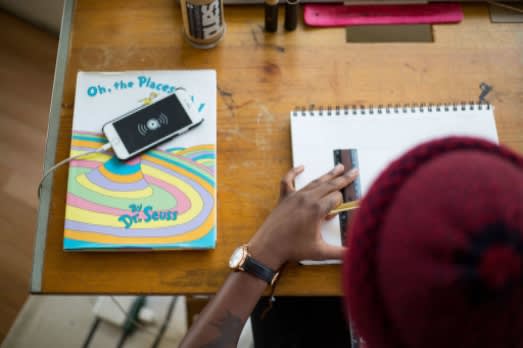Top Tips to Make the Most of Your Time in Copenhagen
Let’s take a look at some top tips that you need to know to make the absolute most of your study abroad time in the city of Copenhagen!
Phoebe
If you're planning to study in Denmark's capital as an international student, then you can look forward to the next six months or two years as some of the most gratifying times of your entire life! However, like any other capital city, Copenhagen may present its own challenges, alongside its many rewards. So, let’s take a look at everything you need to know to make the most of your exciting time in the city of Copenhagen!
Finding the Perfect Housing
For any incoming international student in any locale, ensuring that you find the housing that best suits your personal needs and basic requirements may seem like a daunting task. However, there are numerous ways to ensure that you find the right space, like checking out HousingAnywhere’s rental platform. While many universities in Copenhagen may offer housing to international students for the first year, it is not always a sure thing. Many students apply for this accommodation, and there’s often a long waiting list.
Plus, there are also a few requirements that you need to keep in mind when staying in Denmark, other than whether you want to live in the city centre or have a short commute from a more budget-conscious area of town. Explore available flats for rent in Copenhagen to get an idea of what you're looking for.

Start your search early
When beginning your search for housing, there can be nothing more important than ensuring that you don’t wait until the last minute to start contacting potential landlords. Most experts suggest that you do this at least two to three months before your move to Copenhagen. Keep in mind that having a big list of requirements, like finding a room within walking distance of the university or one that offers particular amenities, will make your search more difficult.
Most incoming students find furnished space that they can sub-let for the duration of their study period. While the furnishings may be included, always check to see which utilities are also covered, such as electric, water or Wi-Fi, to name a few.
Apply for a residence permit
If you plan to stay in the country for more than three months, you will need a resident permit. You will need to go to the Regional State Administration (Statsforvaltningen) if you are an EU/EEA citizen or a Swiss national. You must bring a letter of enrollment from your university in Denmark, a passport photo and a passport or ID card, along with one additional copy.
You will also be required to present a completed OD1 form. You may do this at the office, but to speed things up, you may print it and fill it out beforehand. And to get through the process even quicker, there are certain mornings in the months of August and September when the Regional State Administration is open only to students. Plus, you will receive the resident permit on that same day, rather than waiting for up to three weeks.
Obtain a CPR number
Once you receive your resident permit, you will be able to file for your CPR number. This is your personal ID number to be used while you are in Denmark. To receive it, you will need to register with the Danish Civil Registration System, which is located at the International House in Copenhagen. Be sure to bring your resident permit, your passport or ID card, a form of proof of address in Denmark (your rental contract will do) and the completed entry form, along with a copy of all documents.
You can expect to receive your health card and your CPR number via mail within the next 15 days.

Stick to a Budget
When you are a student studying abroad, more than likely, you are on a budget. Sometimes it can be difficult to stay in a capital city and still keep your finances out of the red, especially in Copenhagen. In fact, the Cost of Living Index has ranked Copenhagen as one of the most expensive cities in Europe. While citizens of the EU/EEA or Swiss citizens may not pay tuition fees, there are still numerous other costs associated with being an international city.
However, there are plenty of ways to study in an amazing destination like Copenhagen and still have a little bit of pocket money to see the sights and have a few drinks on the weekends with your new friends from the university. Using a little bit of creativity can go a long way, stretching your savings much further than you could have imagined. Here are a few ideas to help you get started!

Stay outside of the city centre
The rent is typically always cheaper when not living directly in the city centre. Instead, opt for space in some of the outer lying suburbs like Valøse, Valby or Amager. To get in and out of Copenhagen, you can easily use public transportation or ride a bike.
Get a bicycle
With metro costs of 24DKK for a single ticket, traveling by bike is much more economical, plus you can get in some great exercise. As that Copenhagen is mostly flat, it makes for a really nice area for biking! Finding a used bike is usually pretty simple, with Facebook groups for people selling secondhand bikes. Many bike shops even sell used bikes for low prices. Additionally, you can rent a bike, if you find you will only need one on occasion.
Just remember to follow the proper rules when biking in Copenhagen. You should always hold up your arm to stop and stretch out your left or right arm when turning a specific direction.
Obtain the Ungdomskort (“youth card”)
You can file for the Ungdomskort if you are a student. This public transport card offers unlimited use of Copenhagen’s public transportation at a discounted price of approximately 600kr (around 80 euros) per month. This can be extremely useful for students who choose to live outside the city centre, especially for DTU students, with their main campus situated about 15km from Copenhagen in the city of Lyngby.
Get a part-time job
It’s very typical for university students to have jobs, even with their hectic class schedules and busy social calendars. Even though the extra cash doesn’t hurt, part-time jobs can also offer wonderful work experiences and may help with your acclimation to your new home.

Look for secondhand books
As you can probably imagine, purchasing brand new textbooks for each class can be extremely costly. Of course, students can also opt to buy used books, with many people finding them on various Facebook groups. You can also check out sites like BookFinder or Better World Books. Otherwise, you can also utilize the free libraries in Copenhagen to check out required reading materials.
Pack your own lunches
Most universities offer healthy, inexpensive dining options. However, you can always save more money by packing your own lunch and bringing your own refillable bottle for water.
If you want to step off the campus, you can also check out some other options for dining or places to grab a coffee with friends.
Really Make Copenhagen Your Home
I guess you’ve heard the old saying, “When in Rome…”. Well, that sentiment definitely applies to the magnificent city of Copenhagen as well. This locale is more than just the home of the Little Mermaid statue, with a phenomenal culture just begging for your exploration. However, if you want to really feel at home in Copenhagen, then take a little bit of time to familiarize yourself with the way that the Danes do things, and settle into your new home.

Get a Danish phone number
If you’re going to be in Copenhagen for even a few months, it will save you a lot of money to sign up for a local mobile service provider. You can also sign up for a prepaid service like Lebara, with packages for as low as 100kr per month with 10 hours of calling, unlimited text messaging and 15GB of the Internet.
Getting a local phone will also be helpful in so many other ways. Imagine not having Google Maps to get around a new city? Don’t forget that you can set it to walking or even public transportation directions.
Open a Bank Account
To open a bank account, the CPR number is required, so be sure to have that before your visit to the banking institution of your choice. Some banks even offer student accounts, so check out Nordea or Danske.
Once you have your account arranged, be sure to download the mobile pay app, as that most people in Copenhagen take full advantage of this service. It can also help you with keeping track of your purchases and sticking to that ever-important budget!
It’s also important to mention that you need a Danish bank account if you want to apply for an SU grant, so don’t wait to set one up.
Learn to speak the language
Learning the language will not only make a living in Copenhagen easier, but it will also not drain your new bank account. That’s right, international students in Denmark can take Danish language lessons for free. This is yet another perk that you can sign up with using your CPR number.
Check with the International Office at your university, or any student organizations that you may be a part of should also be able to provide you with information. Be sure to note the deadline for applications to take full advantage of the opportuntiy!

Be aware of the weather
Whenever moving to a new city, a person should make it a priority to be prepared for the climate of that particular destination. Specifically, Copenhagen is known for its rainy season, which is in the autumn and winter. Make sure to bring an umbrella, a raincoat and a wardrobe full of warm clothes, including several pairs of good gloves and boots. Many residents of Copenhagen also take vitamin D pills, especially since the sun often does not come out for days at a time.
You can also check out sites like World Weather Online to learn more about Copenhagen’s climate, including average temperatures and precipitation.
Explore this fascinating city
Even though you are in Copenhagen to study, get out there and find out why it is one of the most well-loved capital cities in all of Europe. The 19th-century Tivoli Gardens is not just for kids. In fact, many enjoy walking through its manicured gardens and tasting some of the local dishes that are offered, but this doesn’t mean that you shouldn’t hop on the carousel for a ride or two, either. If you’d like to take in some history, check out Rosenborg Castle, a 17th-century palace and royal museum.
By now you must be pretty excited about moving to Copenhagen to study at one of the top-rated universities in the vicinity. So, don’t waste any more time! Visit Housing Anywhere and start your search for budget-friendly student rooms in Copenhagen right away.

